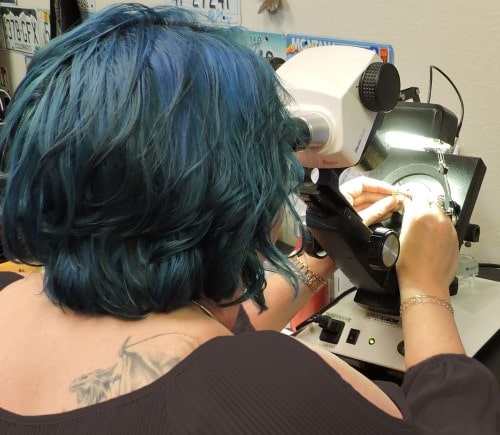Behind every exquisite piece of jewelry lies the meticulous work of a gemologist. These skilled professionals possess a profound understanding of gemstones, their properties, and their value. Learn more about the world of gemology, exploring what a gemologist is, the credentials they need to have, and why their expertise is crucial in custom jewelry making.
WHAT IS A GEMOLOGIST?
A gemologist is an individual who specializes in the study, grading, and identification of colored gemstones and diamonds. They possess extensive knowledge about grading gemological properties such as color, clarity, cut, and carat weight, which are essential in determining the quality and value of gems. Gemologists play a vital role in the jewelry industry, providing insights and services to both jewelry manufacturers and consumers.

Gemologist Credentials
Becoming a certified gemologist requires a combination of education, practical experience, and accreditation from recognized gemological institutions. The following are the key credentials a gemologist needs to possess:
- Education: A gemologist typically starts by acquiring a solid foundation in gemology through formal education. This may include completing a degree or diploma program in gemology, mineralogy, or a related field. These educational programs provide in-depth knowledge about gemstone identification, grading, and evaluation techniques.
- Gemological Institutes: Accreditation from esteemed gemological institutes adds credibility to a gemologist’s expertise. Institutions like the Gemological Institute of America (GIA) and the International Gemological Institute (IGI) offer comprehensive gemology courses and certification programs that are highly regarded within the industry.
- Practical Experience: Gemologists enhance their knowledge through hands-on experience in the field. This involves examining and assessing a wide variety of gemstones, developing a keen eye for detail, and understanding the nuances of different gemstone types.
- On-going Learning: The field of gemology is ever-evolving, with new gemstone discoveries and advancements in testing techniques. A gemologist must stay updated with the latest industry trends, research, and developments. Continuing education through workshops, seminars, and professional networking is vital to maintaining expertise.
The Importance of Gemologists in Custom Jewelry Making
- Gemstone Selection: Custom jewelry making involves creating unique pieces tailored to individual preferences. Gemologists play a critical role in selecting the most suitable gemstones for each design. They consider factors like color harmony, gemstone durability, and the client’s desired aesthetic to ensure the chosen gems enhance the overall beauty and longevity of the jewelry.
- Quality Assurance: Gemologists possess the skills to accurately grade gemstones, ensuring they meet specific quality standards. They assess factors such as color intensity, clarity, and cut precision, guaranteeing that only the finest gemstones are used in custom pieces. This quality assurance instills confidence in both the jeweler and the client.
- Expert Advice: Gemologists provide valuable guidance to jewelers and clients alike. Their extensive knowledge allows them to educate customers about different gemstone options, helping them make informed decisions based on their preferences, budget, and intended use. Gemologists can explain the significance of a gemstone’s origin, rarity, and value, enabling clients to choose unique stones that will be cherished for years to come.
- Authentication and Appraisal: In the world of custom jewelry, authenticity is crucial. Gemologists have the expertise to authenticate gemstones, distinguishing natural gems from lab-grown or synthetic alternatives. Additionally, they can provide accurate appraisals, determining the value of custom-made jewelry for insurance, resale, or estate purposes.
Gemologists are the unsung heroes behind the dazzling custom jewelry pieces we admire. Their profound knowledge, combined with their dedication to quality and authenticity, is integral to the custom jewelry-making process. By relying on their expertise, jewelers and clients can be confident that their creations are adorned with exceptional gemstones that enhance the final piece’s beauty and value.
Top 3 Questions About Gemologists
A gemologist is a specialist in the study and evaluation of gemstones. They analyze and identify gemstones based on their physical and chemical properties. This involves examining characteristics such as color, clarity, cut, and carat weight, as well as using specialized tools to assess authenticity and quality. Gemologists also appraise gemstones to determine their value and may work in various settings, including jewelry stores, laboratories, auction houses, and educational institutions.
To become a gemologist, one typically needs to complete a formal education program in gemology. This often involves earning a diploma or certificate from a recognized institution, such as the Gemological Institute of America (GIA) or the International Gemological Institute (IGI). These programs cover various aspects of gemology, including gemstone identification, grading, and appraisal. Practical experience through internships or working under experienced gemologists is also valuable. Continuing education and staying updated with industry advancements are important for maintaining expertise in the field.
Consulting a gemologist when buying jewelry ensures that you are making an informed purchase. Gemologists provide expert analysis and verification of gemstones, helping you understand their quality, authenticity, and value. They can identify potential treatments or enhancements that may affect the gemstone’s worth and advise on the best choices based on your preferences and budget. By working with a gemologist, you gain confidence in your investment and can avoid potential pitfalls associated with purchasing misrepresented or low-quality gemstones.